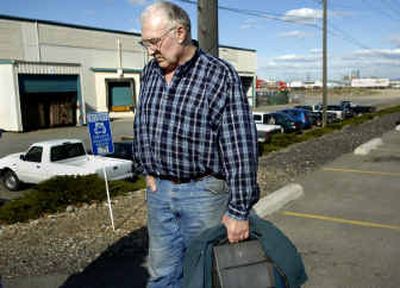Workers see a dim future

Workers at Columbia Lighting are worried the Spokane Valley factory could close, potentially putting up to 500 people out of work.
The company, with a 107-year history in Spokane, is one of the largest manufacturers in the region. Workers make lighting fixtures at the factory inside the Spokane Business & Industrial Park, on North Sullivan Road.
Three years ago Columbia Lighting was acquired by Hubbell Inc., a $2.1 billion Connecticut conglomerate that has made no secret of its plan to relocate its lighting division headquarters to South Carolina and move more manufacturing work to Mexico.
The plan, called the “Lighting Business Integration and Streamlining Program,” is an $80 million corporate initiative begun in 2002 and scheduled to wrap up in 2006. A Hubbell executive said the plan does not single out Spokane.
So far, Hubbell’s reorganization actions elsewhere have meant factory closings, warehouse consolidations and the relocation of manufacturing operations to factories across the border in Tijuana and Juarez, Mexico, according to company financial reports filed with the U.S. Securities and Exchange Commission.
Sam Murray, a Spokane worker, said “people are fearful for their jobs.”
She was one of many employees interviewed outside the Spokane Valley factory who said they were upset that changes are sweeping through the factory without explanation. The loss of several product lines has fueled speculation of layoffs.
“Things have slowed down. Way down,” said machine operator Gary Eldridge. He suspects Spokane work is being sent to a sister factory in Bristol, Pa., which in turn is shipping work to Mexico.
Some employees say the closure rumors may be the product of upcoming labor negotiations between Hubbell and the International Brotherhood of Electrical Workers Local 73, which represents more than 350 Columbia Lighting workers. Most make around $13 an hour with health insurance and retirement benefits.
But Larry Stenson, who has been with Columbia since 1959, said he has been through many contract negotiations and isn’t convinced the rumors are related.
“Something is different this time,” Stenson said. “Everyone out here can feel it.”
Union steward Rob Gabrian doesn’t have answers for jittery employees.
He has read financial reports and doesn’t like what he sees.
“Yeah, you bet there’s a lot of us reading between the lines,” he said. “I’m getting pressured a lot by people, and I’m not being told anything.”
Thomas Conlin, a Hubbell executive in charge of investor relations, said executives can understand why employees reading company reports may be unnerved, but he cautioned against jumping to conclusions.
“There are no current plans to make any changes to the Columbia plant in Spokane. Period,” Conlin said. Local Columbia Lighting managers have been told to refer all media inquiries to Conlin.
“We’ve made no announcements about Columbia,” he added, although he said he could not give assurances that layoffs would not happen.
Conlin described the facilities plan as work in progress, but said the company considers it a success. Since 2002, Hubbell has cut manufacturing space by 20 percent and at the same time produced 15 percent more product.
He added that the manufacturing slowdown at the Spokane plant is a market matter, not the actions of a company preparing for a factory shutdown.
Spokane can ill afford the loss of another major employer.
The region’s manufacturing base lost thousands of jobs in the past five years with the closure of Kaiser’s Mead smelter and layoffs at other companies. The aftershocks have shown up in sectors such as health care because fewer people are offered employer-paid health insurance.
According to Spokane County, Columbia pays about $154,000 in business equipment taxes each year. Its property tax load is less clear because it leases space in the industrial park.
Hubbell on Tuesday released disappointing sales figures for the first three months of 2005.
Bad weather, especially in rain-soaked California, led to a slowdown in construction activity, Chairman and CEO Timothy Powers told analysts during a conference call Tuesday.
Furthermore, Hubbell raised its prices last November in reaction to the rising costs of raw materials such as nickel, zinc, copper and aluminum.
The company’s competitors, however, did not follow suit, and Hubbell consequently lost sales. Powers said the company plans to stick with its price increases.
The stock market has been quick to react.
Hubbell stock closed at $40.19 a share Wednesday, down $8.16 from just a month ago.
Regardless, Powers told analysts he anticipates a construction rebound that will push 2005 sales beyond those of a year ago.
Columbia Lighting’s history in Spokane began in 1898 when German immigrant Rudolph Doerr and Spokane electrican Joseph Mitchell founded it under the name Doerr-Mitchell.
In the 1920s it became the Brown-Johnston Co., headed by Eric A. Johnston.
The name was changed to Columbia in 1940. The company is credited with many innovations in lighting, perhaps none so important as the development in 1966 of light casings called parabolic troffers, which the company puts among the most important lighting developments in four decades.